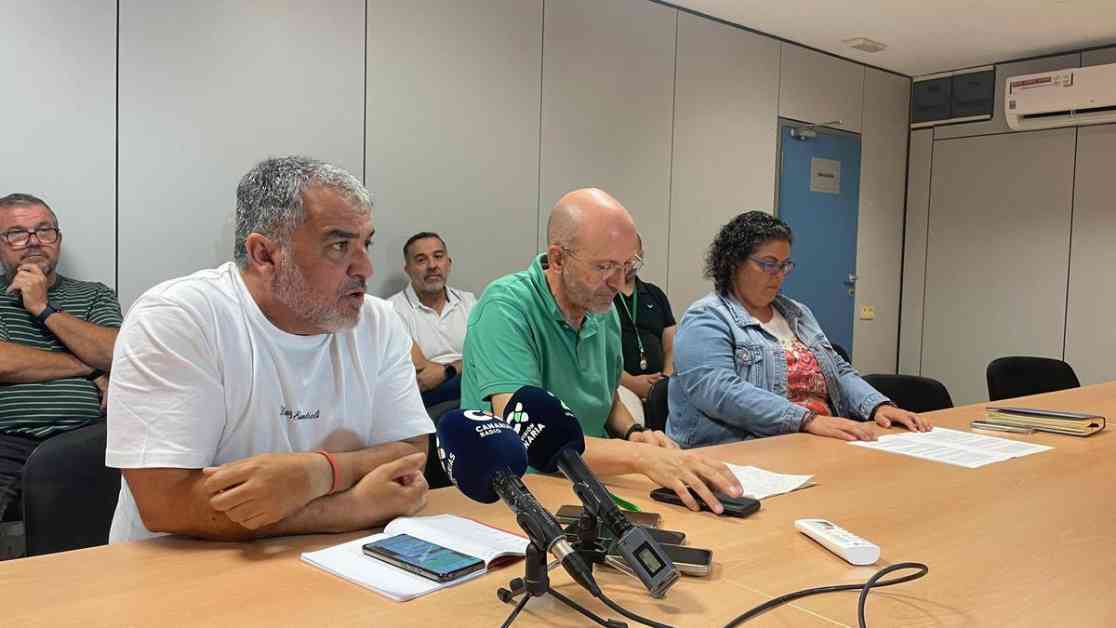The employees of the City Council of Las Palmas de Gran Canaria have called for a demonstration of all sectors of the administration this Friday in the Plaza de Santa Ana, coinciding with the ordinary plenary session of July, to demand labor improvements. Public employees are asking the Government group to fill vacant positions due to sick leave, retirements, and absenteeism in order to stop a decrease in staff that translates into a 30% reduction in the workforce over the last four years. This, according to union representatives, adds to a process in which 1,056 temporary positions must be stabilized by December 31 of this year, but only one position has been filled. «We can’t take it anymore with the situation we are experiencing at the municipal level and the organization of this City Council of Las Palmas de Gran Canaria,» questioned Jessica López, representative of Intersindical Canaria.
Along with the union sections of CSIF, the Union of Workers of the Autonomous Community of the Canary Islands (ST-CAC), and the Works Councils of the Municipal Street Cleaning Service and the Urban Solid Waste Collection Service, the worker representatives explained on Tuesday the reasons why they are promoting this demonstration, which will take place between 9:00 and 11:00 a.m. and aims to arrange a meeting with the city’s mayor, Carolina Darias.
The data from the last union elections differ from those held by the City Council in some points such as sick leave due to temporary incapacity, which according to the «official information» handled by the unions is 40% and according to the Government group on September 21, 2023, was limited to 18% of the workforce. Leonardo Perera, representative of CSIF, also points out that the administration has lost 10.2% of its workers and the Cleaning Service 19.6%. The workforce is also reduced by retirements, as the average age is now around 55 years.
Only one of the 1,016 pending temporary positions has been stabilized with six months to go. The president of the Street Cleaning Committee of the City Council, Marcos García, expressed his «discomfort» because in 2016 there were 500 workers and today the number has been reduced to 231, more than 50% less, while the city continues to grow especially towards the outskirts. The employee recounts that in the past, three-year projects were carried out to cover all needs, but now they are limited to initiatives of the Municipal Institute of Employment and Training (IMEF) with temporary workers for six months to a year. «With this, it seems that the problem is being covered up and an attempt is being made to disguise the great problem we have,» he emphasized.
García also questioned the attempts to meet the needs with «comprehensive cleanings in the neighborhoods that look very nice to the citizen’s face,» but in which the staff assigned has to «take away from somewhere else.» «What we request from this corporation is that they get a little more active and try to find a solution to this pressing problem that does not involve the privatization of the municipal cleaning service and losing an even larger percentage than we currently have,» he added.
Response from the City Council
The councilor for Cleaning, Héctor Alemán, stated on Tuesday at a press conference that the municipal government has «different actions that have been reported and detailed» and that he understands that «do not justify that call.» «There has always been dialogue from this council with the different union representations in the Municipal Cleaning Service. We continue to advocate for a mixed management and service provision model, as has been in place in this city for more than 20 years, with public and private collaboration,» explained the councilor.
Alemán adds that they continue to «bet on updating management» with «an update of new service tenders and, directly, with more than 20 tenders of different types, such as fuels, tires, or spare parts.» He argues that «there is a significant commitment to renewing the fleet for waste collection and street cleaning through a renting specification that we are working on, which will undoubtedly improve the service provision and working conditions of all workers.»
Subscribe to continue reading.





